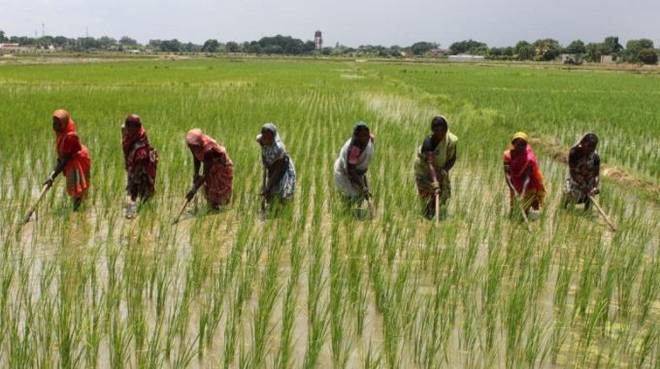For the over two million population of Yobe State and, with a land mass of 45,505 square kilometers, agriculture has remained a major preoccupation.
Almost every household has a history of crop farming, animal husbandry or both. However, like other states in Nigeria, the enormous potentials in this rich agricultural space has not been fully harnessed.
This indeed was the result of an aged culture of manual land tilling that often requires colossal physical energy but with less yields. This has made agriculture less productive, less profitable and therefore, less attractive.
There is no gainsaying that, agricultural production demands a purposive response in order to guarantee it as a means of gainful employment and food security.
It becomes even more so owing to an ever-increasing population and the threat of global climatic and environmental challenges on food production. The need to produce more food and more employment opportunities cannot be overemphasised.
Hence, at the dawn of Mai Mala Buni’s assumption of office as executive governor of the state, he pronounced agriculture and environment among his topmost priorities.
What informed this decision was the awareness of how essential agriculture is to Yobe and the country as well as the knowledge of the devastation communities face due to incessant encroachment of the desert.
The first step taken by the Buni administration was to organise an agricultural summit. It was the first ever agricultural summit in the state.
This gathering of scholars, experts and captains of the value chain industry was convened with the aim of developing a strategic roadmap that will ensure quick wins and long-term solutions on how best to harness these God-given potential and resources for Yobe farmers to have comparative advantage in agricultural production, as it also finds sustainable ways to remedy the hazards of desertification.
A carefully selected group of experts came up with a road map and plan which include among others, drawing up an effective agricultural master plan based on practicable models, feasible schemes and copious subsidies.
The outcome and recommendations dwelled on the need for meticulous securing of sturdy implements and materials, timely procurement and subsidies on fertilizers, pesticides, herbicides and other requisites. It also emphasised on expanding the utility of the industry through revamped storage, processing of produce as well as the facilitation of marketing opportunities to augment the value chain.
Throughout his one year in office, Gov. Buni has consistently promoted these ideas; that agriculture holds a primary key to boundless opportunities that the people of Yobe State can tap into.
The agricultural policies of the Buni administration harped on making agriculture an occupation that must be continuously enhanced in order to improve the living conditions of the entire society.
The key short-term recommendations of the policy culminated in provision of 103 Massey Ferguson tractors and 7,500 metric tonnes of fertiliser, all of which were distributed across the state and sold to farmers and farming associations at highly subsidised rates.
This swift intervention was applauded as a strategic turn that propelled large-scale irrigation and rainfed production of rice in the wetlands of Gashua, Geidam, Nguru, Jakusko, Fika, Yunusari and Yusufari LGAs as tractors and fertiliser become affordable and accessible to many farmers. Similarly, there have been tremendous increases in the production of sesame seeds in Tarmuwa, Damaturu, Fune, Gujba, Gulani, Bursari, Bade, Geidam, Jakusko, Nguru and Machina LGAs.
Realising that this exponential increase in production, particularly cash crops, must be consolidated with an equally advantageous scheme, Governor Buni immediately started working on a direct foreign trade partnership with international marketers. A component of this was to target the Damaturu international cargo airport for future sesame, gum arabic and livestock exports.
Another integrant of the Yobe agricultural masterplan is the ongoing data-capture exercise by the state Ministry for Agriculture for proper planning and policy on incentives such as credit facility, distribution of inputs, land allocation etc. So far, this database has captured 33,450 subsistence farmers, 29,600 medium scale farmers and 9,450 large scale farmers.
To groom a generation of young farmers, Buni also launched the ‘2000 Hectare Youth Empowerment Farm Project (2KYP)’. This project was piloted to test the feasibility of creating massive employment by encouraging young men and women to engage in crop production. As it begins this farming year, 2000 hectares of farmland was harrowed, prepared and handed over to youth for cultivation. This is in addition to over 100 young people who were allocated two/three hectares of farmland with free tractor services, two bags of fertiliser each, seeds, herbicides and extension services all at no cost.
Arrangements have also been made to provide ready markets for immediate purchase of the produce cultivated by these young farmers. Creating jobs and self-sufficiency through agriculture is, no doubt, at the heart of Buni’s conception of a prosperous Yobe State. Although a lot was done in the last one year that augmented the fortunes of many farmers and created the motivation and enabling environment for many people to engage in agricultural activities. This is only the first phase of a far-reaching revolutionary in agricultural development in Yobe State.
Mamman Mohammed is the Director General Press and Media Affairs to Gov. Mai Mala Buni

 Join Daily Trust WhatsApp Community For Quick Access To News and Happenings Around You.
Join Daily Trust WhatsApp Community For Quick Access To News and Happenings Around You.


